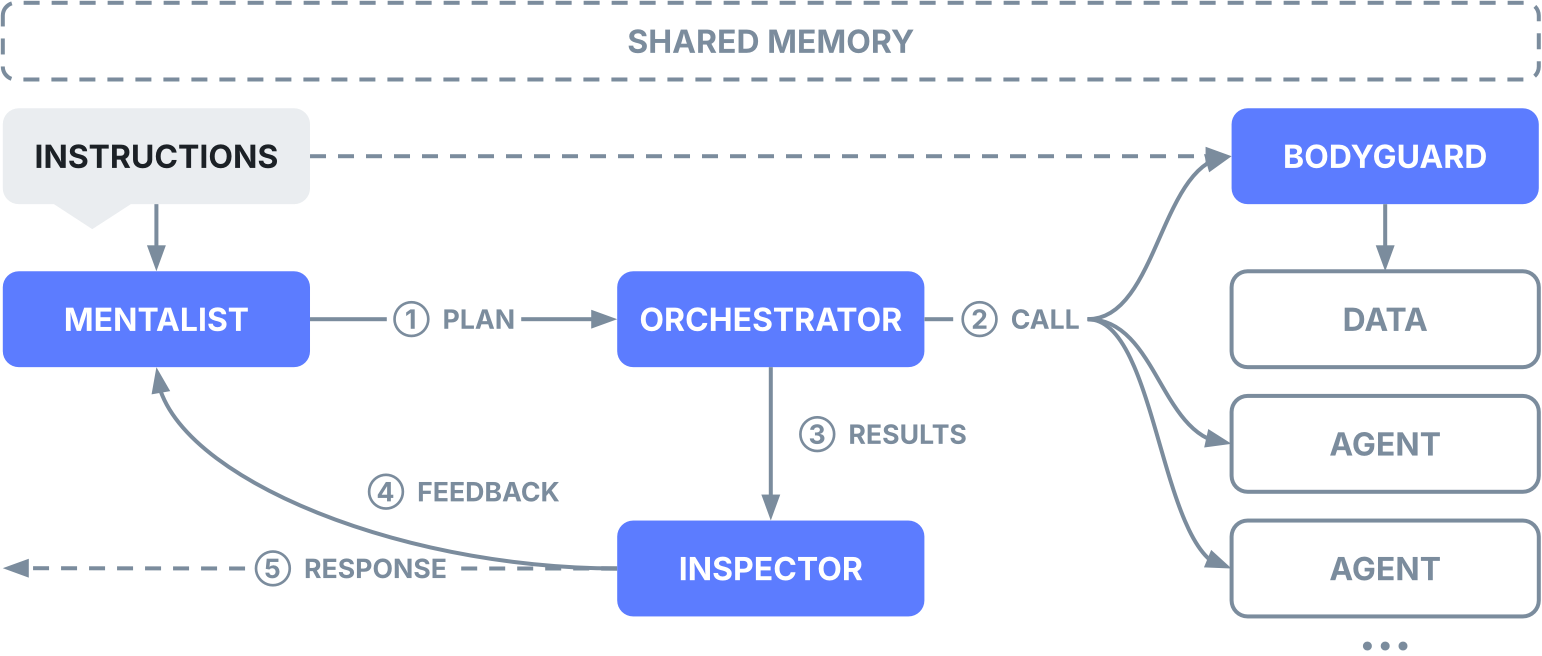aiXplain agentic framework
The aiXplain agentic framework enables you to build trusted, modular, and adaptable AI solutions. It's production-ready, yet flexible enough for rapid prototyping.
Agents in aiXplain are built from modular components that work together through structured interfaces to reason, plan, and act:
- Models: Large language models (LLMs) that interpret instructions, select tools, review outcomes, adapt execution plans, and format outputs.
- Instructions: Natural language prompts that guide agent behavior and response style.
- Tools: A collection of capabilities—including AI assets, custom Python functions, pipelines, data sources, and other agents—accessed through a unified interface to perform specific tasks.
- Memory: A shared store used to track instructions, intermediate outputs, and task state, while also providing persistent storage for user context and multi-turn interactions across a session.
- Guardrails (coming soon): Policies and filters that enforce content safety, access control, compliance, and input/output validation.
These components allow you to create agentic solutions that solve complex problems and automate execution through AI reasoning. Tracing and logging allow you to see under the hood—every thought and step the agent takes—for debugging and iteration, as well as for auditing and tracking guardrail violations.
Agent architectures
aiXplain supports modular agent architectures tailored for different types of AI-driven tasks:
Agent
A single-agent system capable of handling well-scoped tasks autonomously using natural language understanding, reasoning, and tool use. It supports multi-turn interactions and adapts dynamically using memory—ideal for focused use cases that benefit from iterative execution but don’t require multi-agent coordination.
Agentic RAG
A design pattern within the Agent architecture. The agent uses retrieval tools to extract information from trusted sources—such as unstructured documents, structured databases (CSV, SQL, NoSQL), or online sources (Google Search, websites)—to ground and verify its responses. Unlike traditional RAG pipelines, the agent autonomously controls when to retrieve, what to retrieve, and how to apply the information, enabling more accurate and explainable outputs.
Team agent
A multi-agent system designed to solve complex tasks by autonomously distributing responsibilities across multiple user-defined agents. It shares the core capabilities of a single agent—reasoning, tool use, and multi-turn interaction—but introduces planning and cross-validation to enhance reliability, compliance and control.


Learn more about Team agents →
Pipelines
Structured workflows that execute tasks in a predefined sequence, offering full control, determinism, and modularity. They’re ideal for repeatable automation flows and can be used within agents as tools to extend their capabilities with static, deterministic logic.
Specialized agents
aiXplain includes a set of built-in specialized agents in both Agent and Team Agent architectures to improve reliability, enforce constraints, and enable more structured execution:
- Mentalist agent – plans and decomposes the task
- Inspector agent – applies guardrails to validate prompts and responses for safety, compliance, and performance
- Bodyguard agent – enforces role-based access and data privacy controls
- Orchestrator – manages coordination, tool invocation, and execution order
- Response agent – formats the final output based on user-defined criteria
- Evolver agent (coming soon) – attaches to any agent to observe behavior, iterate on logic and tools, and benchmark performance over time.
This role-based agent ensemble enables collaborative problem solving, policy enforcement, and scalable, layered decision-making within a unified agent system.
The Mentalist and Inspector agents are only available for Team agents. Support for full specialization within agents is coming soon.
Getting started
Ready to build your first agent? Check out the Getting started guide to begin creating and deploying agents using the aiXplain framework.